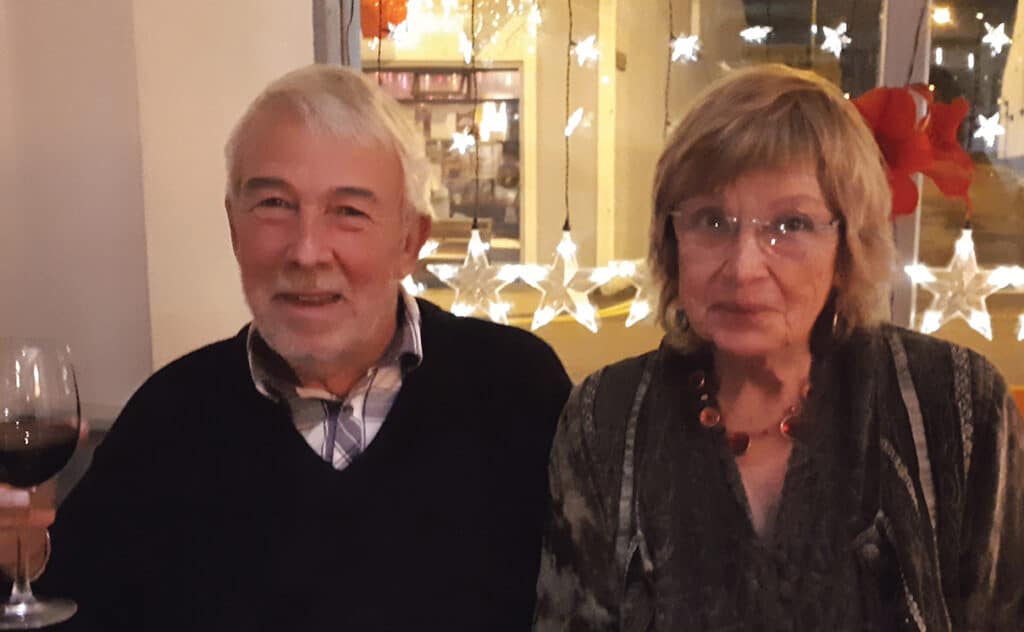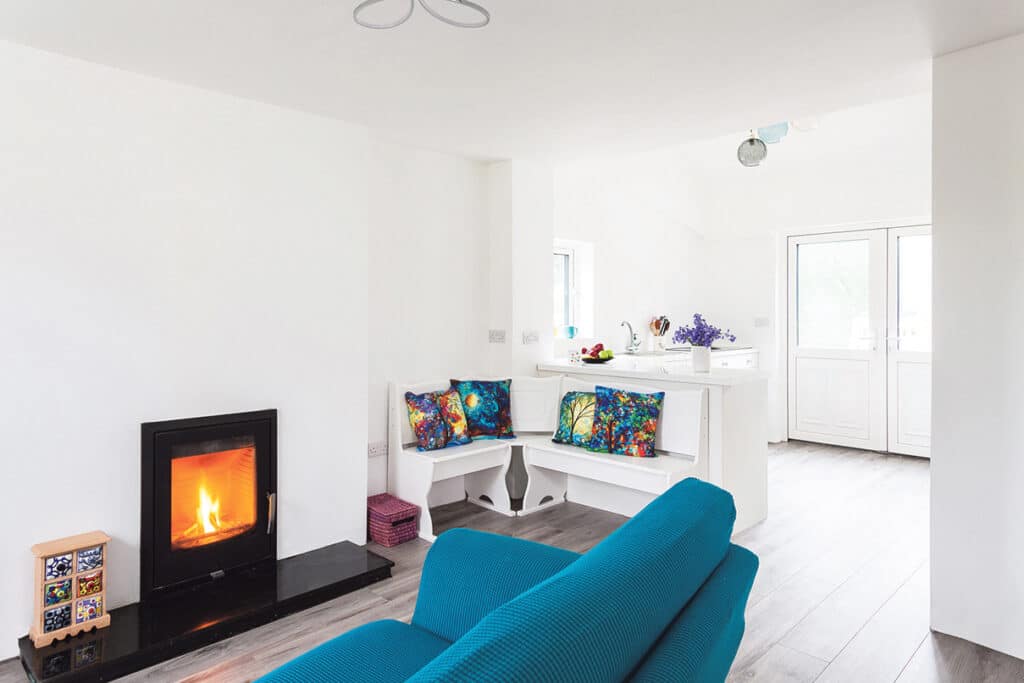Mary Grover turned 80 in February. “I wanted to go somewhere hot to celebrate it with my husband but of course that didn’t happen,” she shrugs pragmatically.

Mary, a retired counsellor and psychotherapist and her husband John, a retired builder, live in Skibbereen where they run a busy AirBnB on their property.
Last Christmas, Mary was diagnosed with chronic obstructive airways disease; breathlessness and exhaustion are two of the main symptoms.
“Early on I realised that I was high risk and if I got this virus, the chances are that I would probably die from it,” she says.
As difficult as it is to live with a lung condition at her age (even vacuuming takes huge effort), Mary refuses to let her condition stop her living life to the full. The location of the couple’s AirBnB, up a steep slope behind their home, means that the regular changeover of guests can be quiet exhausting, particularly for Mary; the couple do everything themselves – cleaning, disinfecting and changing of beds in the BnB.
John is about to turn 77. “He’s my toy boy,” says Mary laughing. “He’s very active, always likes to keep busy.
“ I think some people believe we have been foolhardy but we’re very careful,” says Mary, as she explains that financially the couple needed to keep the BnB open over the summer.
After such a busy season, they recently escaped away to Galway for a weeklong break.
Although she is missing her monthly Amnesty meetings, book club and water aerobics, Mary says she’s lucky that she likes her own company; “most of my hobbies are solitary outings but I did miss having friends around for dinner during lockdown.”
“Underneath it all, I think I am anxious,” she says. “But I have more of an appreciation of what’s important and the things that make life worth living, every day.”
In the article below, Mary talks about some of the difficulties facing her generation in the current pandemic and ways of coping.
‘It is in the shelter of each other that the people live’…or is it?
Each generation has had to face the difficulties that Covid-19 has deposited upon us. But today I am concentrating on our generation says retired psychotherapist Mary Grover – the ‘oldies’ the retired; the over 65s or 67s depending when you got your pension. Can we cope? Yes, we can.
At 80, I had thought that, once retired from work and raising a family, life should have become easier. But many of us are limited in activity, or illness. We have not the vigour we once had and took for granted, never thinking it would run out. We are tired a lot of the time. We do less. We let things go – and there is relief in that… We don’t cope with change as well as we used to. We develop routines and habits, which give a sense of security and can feel disturbed if they are. Old age is not all it is cracked up to be!
And along comes Covid-19. If one has a job, has to earn a living, pay a mortgage or rent, rear children, one’s time is consumed in coping with life present and future, and overcoming the obstacles created by Covid.
If one has no work, but enough security of a home and basic needs, one is left with time to spare and this is when depressing gloomy thoughts enter. Our moods fluctuate. I can be phlegmatic with regard to my own fate if I develop Covid, but when I consider that my sons and daughter are in their fifties, so also at risk, I feel a sense of panic. One moment angry at nothing, the next moment wondering what that was about. One moment more tolerant towards others, the next, less so. One moment anxious and even a little paranoid, the next dismissive of the risk. The internal seesaw is not in equilibrium. Our worries become enlarged, we have time to feel abandoned, lonely; time to twiddle our thumbs. Again, the question – how do we get through this grim period in the life of the entire world?
The Irish are such a gregarious nation, in the main. We are generous, giving and helpful. Heaven forbid that the goodness of these qualities should vanish but sometimes they come at the price of not valuing oneself sufficiently. We forget that we are the most important person in our lives. This has nothing to do with pride. We can be too self-deprecating. For those who practice a strong faith, it is in fact on the first page of the Catechism. ‘God made you in His own image’.
We can be too dependent on others. Social interaction and close involvement are important but we have to find ways to cope when we cannot attend church, not go to bingo, not meet in groups; when the neighbours can’t call in, nor us to them, the pubs are shut, the small kindnesses of the early novelty of the shut-down have stopped.
What are these ways? The first is to recognise that we have an opportunity, many opportunities, to develop ourselves in all sorts of ways. While we are still alive and compos mentis we can go on learning and discovering without the need for other people around.
Many have commented on the keener appreciation of nature since the lockdown. We can go for walks and see how many flowers, shrubs, trees we can name – or not name but want to find out – which ones please us most, and which least. We can sharpen up our senses.
We can write down family history and the family tree for the future generation. It doesn’t have to be perfect – your own words and memories are what really will count.
We can write the story of our lives – holidays, school, first job and so on; not for the family, but to remind ourselves of the past.
We can learn to use our new smart phone and/or computer better.
Pick up a tin-whistle or any musical instrument going unused. Play around with the keys.
Did we enjoy any hobbies as a child? Try and remember what we used to get pleasure from – wood whittling, knitting, crochet, taking apart old radios, making scrap books, model making. Buy a kit and have a go!
Books! Can you contact the library by phone? Ask for uplifting, light books if you need to get out of yourself? Ask friends for loan of books. Have you got books that you have never got around to reading?
Plan your day – any plan will do that suits you. Keep to your regular meal times – in fact, once or three times a week cook something a little different from your usual diet. Look for easy recipes on the TV!
Routine is good, though hard to keep up when we are listless. Be a firm but kind father to yourself to guide you from slumping.
Exercise really does help to lift one – I should know, as one who was lazy, now having to go for daily walks for my health issue. I have really appreciated the wild flowers I used to drive past, thinking I was then. I look forward to seeing them each day and how long each variety lasts and which come next.
Think of a treat for yourself every day – it doesn’t have to be big – it is good to have something to look forward to that you have created yourself.
We need to rebuild new footings, to learn more about ourselves, to stretch our minds, which do not retire, and to discover more that is worthwhile in our world and, most importantly, within ourselves.
In the Guardian, Rebecca Solnit quotes from a justice activist, Mariame Kaba ‘Hope doesn’t preclude feeling sadness or frustration or anger or any other emotion that makes total sense. Hope isn’t an emotion. Hope is a discipline’.
Let’s hope we will all have more faith in our capacity for hope.
If none of these words or ideas has any impact on you, do contact one of the organisations below for more support.
Alone COVID-19 support line for older people: Phone 0818 222 024, 8am to 8pm everyday. www.alone.ie
The Alzheimer Society of Ireland: Information and emotional support and information on supports and services. Freephone 1800 341 341 Monday to Friday 10am to 5pm and Saturday 10am to 4pm. email: helpline@alzheimer.ie
The Dementia Resource Hub provides signposting to information and online resources for people with dementia, families and carers. Visit alzheimer.ie or understandtogether.ie.
Seniorline: Confidential listening service for older people provided by trained older volunteers. Call 1800 804 591 from 10am to 10pm everyday. Visit thirdageireland.ie
Age Friendly Ireland: For a list of all Local Authority Community Response Forums and their contact helpline numbers to support vulnerable members of communities affected by COVID-19 restrictions visit agefriendlyireland.ie



